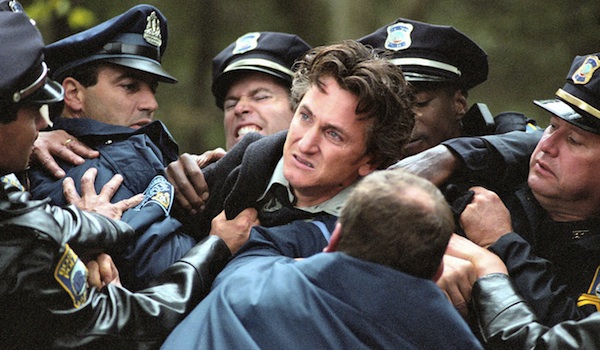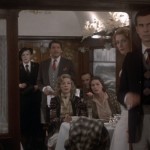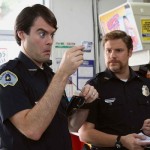Mystic River Review
Mystic River vs. Million Dollar Baby. It’s a debate I’ve had over and over again (with myself, pathetically). Most would agree that Clint Eastwood has undergone some kind of renaissance in recent years. Did it peak with the esteemed director’s 2004 Best Picture winner? Or has it been downhill since the 2003 Dennis Lehane adaptation. When I assembled my end-of-decade list in December, “Million Dollar Baby†placed slightly better than “Mystic River.†But upon revisiting them both this month, I think I’m leaning slightly closer to the latter film. Ultimately, “Mystic River†is a more ambitious, and thus, more accomplished picture.
In a neighborhood outside Boston, Jimmy Markum, Sean Devine, and Dave Boyle are best friends. While playing hockey one day, a man comes up, disguised as a police officer, and abducts Dave. Four days later, he escapes, but neither he nor the bond between the three boys will ever be the same.
Flash forward a number of years, and the boys are estranged adults. They rarely see each other, and when they do it’s just a polite nod of the head. Jimmy (Sean Penn) is a shop owner and reformed criminal. He has three daughters, but the apple of his eye is his oldest, Katie (Emmy Rossum). Dave (Tim Robbins) is married and a father, but he’s socially withdrawn. And when he comes home one night covered in someone else’s blood, his wife (Marcia Gay Harden) gets a little spooked. Sean (Kevin Bacon) is a cop. He and his partner (Laurence Fishburne) are called in to the old neighborhood to investigate a murder—the murder of Jimmy’s daughter Katie. The subsequent investigations (the one by Sean and the unofficial one by Jimmy and his goons) bring the three former friends together in shocking ways.
“Mystic River†has just about everything. The performances are amazing, the direction is steady, the writing is tremendous, and the technical features are impeccable. But the best thing about the film is its complexity. The film covers a lot of ground, has many subplots, and makes you think about a number of issues. What the film comments most about is the meaning and importance of justice, and its final few scenes exhibit these main points just perfectly and heartbreakingly.
Clint Eastwood has never been the most subtle director—for the best evidence of this, see his (in)famous “Get off my lawn†scene in “Gran Torinoâ€â€”and that’s true here as well. His tendency for bombast is the only blemish on this otherwise phenomenal motion picture. But he manages to keep all the different threads of the plot in motion, and for that he should be commended. The film just works on so many levels.
Sean Penn won his first Oscar for his work here, as did Tim Robbins. They are both exceptional. The scene in which Jimmy finds out his daughter has been murdered is brutal, as is the scene in which he punishes the man who he thinks committed the crime. Despite what some would say, however, this performance is more than just one or two great scenes. Throughout the rest of the film, Penn show quiet, but dignified grief, and it’s an incredible thing to behold.
Robbins too deserved every accolade handed to him. His character is sad and introverted, but knowing where his pain comes from makes him immediately sympathetic. Still, he has a really scary side. Dave is probably one of the most complicated characters in recent memory. And Robbins makes him that way.
The rest of the actors, while they didn’t win Oscars, are still quite excellent. Kevin Bacon rounds out the rest of the main trilogy, and while he doesn’t have as much to do as the other two, he’s still strong. Marcia Gay Harden—one of the most versatile actresses working today, in my opinion—plays Dave’s wife, a conflicted who loves her husband but is afraid of him and needs to take care of their son. She’s as good as ever. Laura Linney plays Jimmy’s wife, who is just as complicated, if not more so, than the other characters. And Laurence Fishburne gives the film a little comic relief as Sean’s partner, Whitey.
Technically, the film is on as solid ground as any. The editing, especially leading up to the conclusion, is outstanding. It never calls attention to itself, and it maximizes tension while balancing two separate climaxes. The soundtrack is emotional and subtle (despite going over the top occasionally). And the camerawork is terrific.
Unfortunately for Eastwood and his film, it went up against the behemoth that was “The Lord of the Rings: The Return of the King†at the Oscars. But that shouldn’t take away from this great accomplishment. It’s one of Eastwood’s best films, along with “Unforgiven†and yes, “Million Dollar Baby.†But at this moment in time, I have to give a slight edge to his brilliant crime film over his groundbreaking western and his contemplative boxing film.















